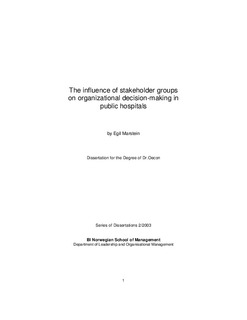The influence of stakeholder groups on organizational decision-making in public hospitals
Doctoral thesis
Permanent lenke
http://hdl.handle.net/11250/94318Utgivelsesdato
2003Metadata
Vis full innførselSamlinger
Sammendrag
he thesis presents a contextual analysis that makes an exposition of the structural contingencies of the Norwegian welfare state. A descriptive/ empirical analysis of the public hospital’s decision-making processes provides insight into how stakeholder groups shape the premises of the public hospital’s value creation-process. The thesis’ theoretical propositions are vested in hospitals’ efforts to achieve a stakeholder balance between competing constituent interests. A thesis proposal on descriptive/empirical stakeholder theory is exempt from normative prescriptions on the intrinsic value of all stakeholder groups. The “stakeholder theory of detachment” See thesis section 11.5.3 “Theoretical contributions”. reflects thesis findings that stakeholder management takes place in a departmentalized fashion without an integrated operations perspective. A conceptualization of “stakeholder compliance” See thesis section 11.5.3 “Theoretical contributions”. is introduced and vizualises the embedded nature of stakeholder management in public hospitals. The model is grounded in the empirical accounts on how stakeholder management employs differentiated decision processing techniques at different organizational levels to achieve an optimum balance between competing constituent interests.
The thesis summary and conclusions culminate in a set of implications. These address the need for a renewed national discourse on the governance of public hospitals. The thesis empirical findings on the consequences of non-integrated stakeholder management, call for reviews of governance models and managerial practices. Empirical evidence confirms a pattern of decisional sedimentation in which executive-, operational- and ward hospital management work strategically detached on issues of overall strategic importance. The thesis contends that hegemonic and autonomous management make room for staged and manipulative stakeholder behavior. As generalized through this empirical field study, the operational practices of public hospitals exempts authorities from the exercise of rational choice.
Serie
Series of Dissertations2/2003
